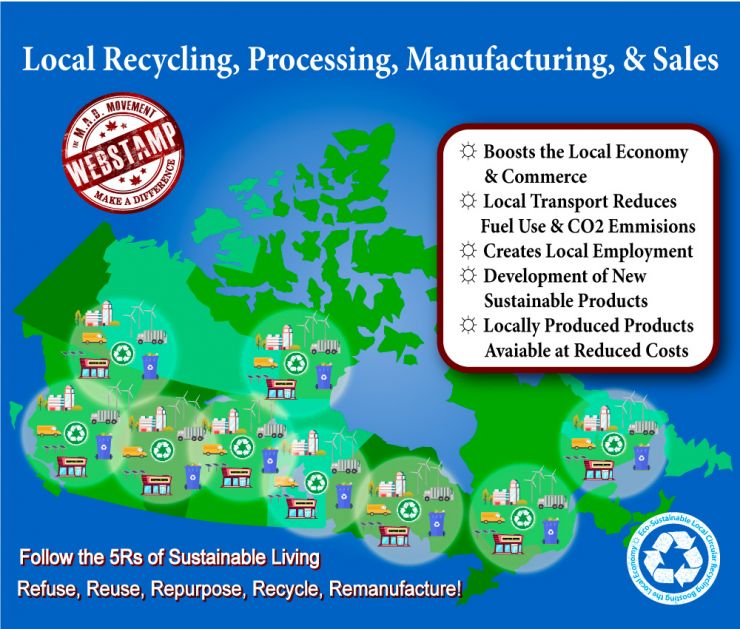WebStamp October 09, 2019
M.A.D. Economic Move #5 – Production
Producing more new products from reclaimed materials would be a great procedure for developing a sustainable economy. There would be a use created for the many hard to process recycled materials that currently have no market value while creating jobs and combating climate change. More incentive is required to develop innovative solutions similar to the taking of clamshell plastics, coffee cups, plastic bags and zip-lock bags as done by the Winnipeg-based company, ReGen Composites, that produces benches and building blocks from it.
Some progress has been made towards the distribution of recyclable materials like holding manufacturers responsible for the cost and processing of their packaging similar to the EPR program in B.C. This program needs to be expanded nationwide and have collaboration between governments and businesses to help create a true sustainable Circular Economy.
The building of plants and facilities regionally that reclaim materials and produce new eco-sustainable products should be done in unison with all forms of government. The government can then lease these facilities to entrepreneurs that would run them more efficiently than the government can do. Wages for employees would be based on the production of the facility and not on an inflated governmental rate. As an example, the City of Calgary could do this with city-owned golf courses that are losing money because of several city employees being paid 2 to 3 times over that of the public sector.
Facilities, such as plastic remanufacturing plants built near major urban centres in several locations spread around Canada, would provide local employment, help stimulate local commerce, and reduce pollution. A local regional facility would save costs by helping reduce the cost of shipping recyclables compared to across the country or world. This would also greatly help global climate change by reducing the amount of carbon dioxide produced to transport recyclables.
The products made from these facilities should be sold and distributed locally so it helps the local regional economy. Again, we save on having to ship products, or bring in, to and from far of places reducing gas-house emissions. With about 90% of plastics in Canada currently not being recycled with local facilities, we could actually process it saving our environment, making a big impact on climate change, create jobs, and boost the economy. With new materials extracted from recyclables, we could see business and more new companies starting-up making eco-sustainable products.
These reclamation facilities could be built using the new sustainable building products produced from recycled materials. They should be built with a zero-carbon footprint using the latest technologies preparing Canada for an Eco-friendly Sustainable Circular Economy. Having more local smaller companies producing building supplies for local distribution helps to tailor the industry to the needs of the area and stabilizes the local economy by not being so depended on outside sources.
Achieving Eco-friendly circularity cannot be achieved on the basis of recycling alone. There is a need for reducing barriers for recycling materials used as raw materials. This requires the need for the consistent eco-friendly design of products including buildings and infrastructures. This allows for increased product life and can provide the same service with less material requirement, facilitates repair, resale, and product upgrades. There is a need to develop modular manufacturing/remanufacturing, component reuse, and End-of-Life recycling for all products produced.
The goal is to achieve a reversal of the trend of global growth in resource consumption into a dynamic Eco-sustainable Circular Economy. M.A.D. Move #5 is about promoting the production of Eco-sustainable products with the wasted resources available from reclaimed materials harvested from recyclables. It is also about creating Circular Business Models that make recycling beneficial to the local economy in a sustainable way. Inform your politicians, local, provincial, and federal, that they should all work together with commerce towards developing an Eco-friendly Sustainable Economy. It’s Up To You!
Articles in this Issue
WebStamp October 09, 2019
References:
https://hbr.org/1993/11/recycling-for-profit-the-new-green-business-frontier
https://www.thebalancesmb.com/recycling-facts-and-figures-2878049
https://onlinelibrary.wiley.com/doi/pdf/10.1111/jiec.12244
https://sweden.se/nature/the-swedish-recycling-revolution/
https://globalnews.ca/news/5222837/winnipeg-creative-products-recycle/








